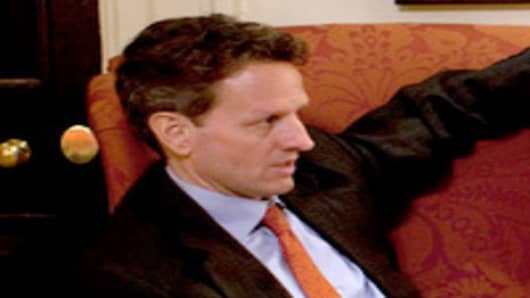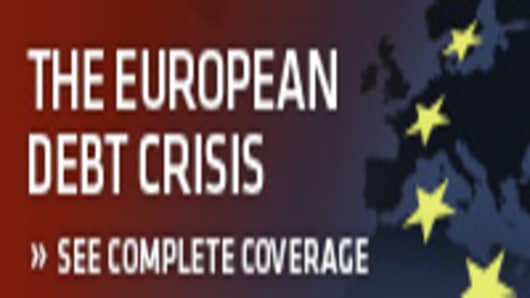Following talks with the Chinese in Beijing, US Treasury Secretary Tim Geithner arrives in Europe Wednesday looking for Europe to get its act together as the debt crisis continues to drive market volatility across the world.
Amid speculation that the recent €750 billion ($922 million) International Monetary Fund/European Union rescue package and European Central Bank intervention will not be enough to avert a fully-fledged liquidity crisis and the collapse of the euro, Geithner will warn leading European policy makers to remain unitedand push for banking system stress tests.
With Germany pushing ahead with tough measures against what German Chancellor Angela Merkel’s government describe as speculators, Europe is sending a mixed message to the markets.
Without the support of the UK or many euro-zone members, the EU looks split on key issues at a time when Geithner and the US administration think they should be standing united. But analysts are skeptical about what benefit the Treasury Secretary's trip will have.
"I have never seen Geithner as a reassuring figure and rhetoric alone will not avert this crisis” said Michael Yoshikami, president & chief investment strategist at YCMNET Advisors in San Francisco and a CNBC contributor. “I would not count on the rhetoric over the next two days from the US treasury Secretary, only (Federal Reserve Chairman) Ben Bernanke has been able to calm investor sentiment during the crisis of the last few years."
First the Easy Meeting
Geithner’s first stop will be in London where he will meet with new UK Chancellor of the Exchequer George Osborne and Bank of England Governor Mervyn King.
This is likely to be the easiest of Geithner’s meetings, with the UK government backing the US position on financial regulation. But even in London there are key differences on the policy response the debt threat.
George Osborne has made it clear that his government is going to cut spending in a bid to protect the UK’s credibility on international markets.
Geithner will back this sentiment in public, but his time as president of the New York Fed and then as Treasury Secretary has seen him spend, spend and spend some more to help keep the US economy from falling back into recession.
With the Congressional Budget Office in the US saying stimulus spending added 4.6 percent to first quarter gross domestic product (GDP) and helped create 3.4 million jobs, it is clear Geithner and President Barack Obama sit in the "spend now, cut later" camp.
Then the Important Meeting
After leaving London, Geithner will head for what is likely to be the most important meeting in Europe, with the only Frenchmen he will officially meet on the visit: ECB President Jean-Claude Trichet.
With the traditional euro-zone power bloc of France and Germany deeply divided over the response to the crisis Trichet’s response has both helped to calm down the euro zone bond market and weaken the euro.
Concerns that asset purchases by the ECB will be inflationary pushed the euro lower and when Geithner and Trichet sit down in Frankfurt they may be fighting over who has the best "strong" (weak) currency policy.
“Nobody wants a strong currency, the dollar has reserve currency status, maybe the UK does as well but in the current environment the euro is losing its status as a reserve currency,” Paul Donovan, senior international economist at UBS, said
A weak euro is bad news for the US, and by extension China, but with the politicians divided Trichet is the only true backstop for the European financial system and will have to keep buying up assets. And if some in the market are to be believed, he will need to take even more drastic action.
“All of the burden within the euro zone in on the ECB at the moment,” Donovan warned. And others agree.
“Although the ECB’s balance sheet is growing at about a 16 percent annual rate, broad money growth has gone into reverse gear, inflation expectations have collapsed, and credit spreads have widened” Michael T. Darda, the chief economist at MKM Partners, said.
“The combination of widening credit spreads and weak growth in the money stock is a toxic mix for nominal GDP," Darda said. "Without nominal GDP growth, fiscal austerity efforts may prove futile, and regional budget positions may continue to deteriorate. Thus, more aggressive ECB action is likely required to subvert a double-dip recession in Europe and short-circuit the potential for serial defaults in weaker peripheral nations."
There has also been speculation in recent days that the ECB will have to team up with the Fed and others to offer further support to global liquidity, which would be another reason why the meeting is crucial.
At the End, the Difficult Meeting
Geithner’s meeting with German Finance Minister Wolfgang Schaubel will be tense. Merkel’s attack on the speculators has drawn criticism from Geithner, but with the chancellor’s coalition under severe pressure, Schaubel is unlikely to be in the mood to take advice or criticism from the Treasury Secretary.
They key issue will be Germany’s unilateral action on financial regulation and naked short-selling. The issue is plays well with angry German voters but has been widely criticized on Wall Street and in the City of London.
“What is the German government trying to hide? This sort of thing does not lead to calm, this is not helping and will not stop a speculative attack” Donovan told CNBC.
“The German economy is doing relatively well, the weak euro is better for exports but there are concerns in the market about the German banking industry, the danger with banning naked short-selling is it drives investor suspicions and they will demand a higher risk premium as result," he said.
Who Are You to Talk?
Geithner will push Germany and other euro zone members to finally undertake a comprehensive stress test of the European banking system, CNBC has learned. The Treasury Secretary, like many investors, may think Europe has no sense of the scale of the bad debt problems sitting on banks balance sheets.
In October, EU finance ministers unveiled the results of stress tests on the region's lenders, saying European banks would be able to withstand a harsh recession in spite of further heavy losses.
The warning from Geithner will not go down well in Germany or other euro-zone countries and Schauble in particular is likely to be looking to answer some serious questions of current US policy.
Germany is very proud of its frugal spending and competitive economy in recent years that have seen it thrive as an exporter. A big part of the political problem for Merkel is that voters are angry that they are being asked to bailout the spendthrifts when they have been so careful.
As the CBO outlines just how big an impact US stimulus spending is having on growth in the States, Germany could be forgiven for asking when America plans to get its own house in order as it runs up a $1.6 trillion budget deficit of its own.
Others are beginning to ask that same question.
“The euro is heading down towards 1.16 versus the dollar, but later in the year we could see dollar weakness as UK and euro zone have taken credible action to cut government spending, America has not” Alex Lawson, the financial risk manager at MoneyCorp, said.




